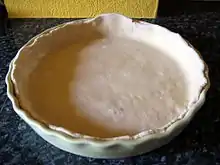pâte brisée
English

pâte brisée in baking mould
Etymology
Borrowed from French pâte brisée (literally “broken dough”).
Noun
pâte brisée (uncountable)
- (cooking) A form of shortcrust pastry made with butter instead of lard or shortening.
- Hypernym: shortcrust pastry
- 1989, Anne Willan, La Varenne Pratique: Part 4, Baking, Preserving & Desserts, BookBaby (→ISBN)
- Pâte brisée is the French version of pie pastry, made in traditional European style directly on the work surface with the dry ingredients spread in a well or “fountain” to enclose the fat (usually butter), egg yolks and water. The name means broken dough, because the ingredients are “broken” into each other after mixing, then kneaded until they are as pliable as putty. Pâte brisée is rolled more thinly than pie pastry, to about 1⁄8 in/3 mm thick. The French like their pâte brisée to be thin yet […]
- 2008, Michel Suas, Advanced Bread and Pastry, Cengage Learning (→ISBN)
- Because pastry is such a dynamic field, and many like to make their own variations, formulas tend to vary significantly from source to source, and pâte brisée is a good example of this tendency. Some varieties may use bread flour, others pastry flour. Some may contain sugar, others not. However, according to Traite de Patisserie Moderne, a bible for pastry terminology, pâte brisée should not contain sugar (Darenne & Duval, 1974, p. 60). Some may contain water, others egg, some just […]
Translations
form of shortcrust pastry — See also translations at shortcrust pastry
|
|
Further reading


French
Pronunciation
- IPA(key): /pɑt bʁi.ze/
Noun
pâte brisée f (plural pâtes brisées)
- pâte brisée
- Coordinate terms: pâte à foncer, pâte feuilletée, pâte sablée, pâte sucrée
Further reading

This article is issued from Wiktionary. The text is licensed under Creative Commons - Attribution - Sharealike. Additional terms may apply for the media files.